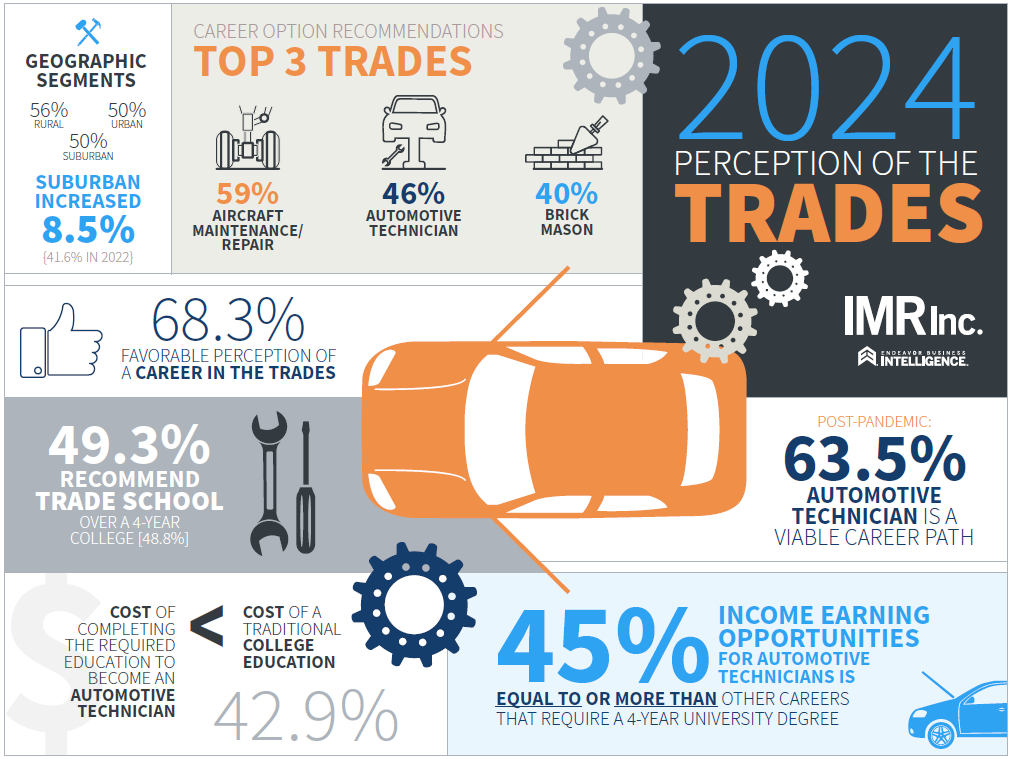Perception of the Trades: Evolving Attitudes and Recommendations
In recent years, conversations around career options for the next generation have seen a notable shift, with traditional 4-year college degrees remaining prominent but with a growing recognition of the trades as a viable and rewarding career path.
Among households discussing career choices with their children, 52.4% mentioned a 4-year college degree as an option, up from 45.5% in 2022. Additionally, 51.6% actively recommended this path, an increase from the previous year’s 45.6%. However, when it comes to what children are most seriously considering, 45.6% are leaning towards a 4-year college degree, up from 33.5% in 2022. The interest in immediately entering the workforce has dropped to 25% from 33.8% in 2022. Among those considering immediate workforce entry, a substantial 87.4% are eyeing jobs in the trades, an increase from 84.5% the year before.
Households with some college education are almost evenly split between recommending trade school (49.3%) and a 4-year college degree (48.8%). The influence of personal connections in the trades is apparent, with 72.8% of households with a family member or friend in the trades being extremely likely to recommend this career path, a significant rise from 64.6% in 2022.
When discussing trades specifically, aircraft maintenance and repair (59%), automotive technician (46%), and brick masonry (40%) are the top recommendations. Notably, rural households are more inclined to recommend the trades (55.9%) compared to their urban and suburban counterparts (both at 50.1%). This marks a notable increase in suburban household recommendations from 41.6% in 2022.
The pandemic has played a role in shaping these perceptions, with 68.3% of households now viewing careers in the trades more favorably. The financial aspect is also a key consideration; 42.9% fully agree that the cost of becoming an automotive technician is significantly lower than that of a traditional college education, and 45% believe that the income potential for technicians can match or exceed that of careers requiring a 4-year degree. Younger generations are particularly inclined to agree with this sentiment.
Job security in the trades, particularly in automotive technology, is another critical factor. 41% of respondents fully agree that there are many unfilled positions in the industry, offering high job security, with those who completed some high school being more likely to agree.
The perception of working as an automotive technician is generally positive, with 63.5% strongly disagreeing with the notion that it’s merely a job and not a viable career. Hispanic households, in particular, largely see it as a viable career path. However, there is still work to be done in terms of gender perceptions—only 21% of households fully agree that career opportunities for women in the trades are abundant, a decrease from 26% in 2022. Women themselves are less likely to agree, with only 13% in favor, down from 19% the previous year.
Lastly, public perception remains divided. Over a third of respondents feel that automotive technicians are often portrayed negatively, and opinions are mixed on the type of individuals attracted to the trade and whether the work is too physically demanding.
As these perceptions evolve, the trades are increasingly being recognized not just as an alternative to a 4-year college degree but as a valuable and potentially lucrative career path in their own right.
